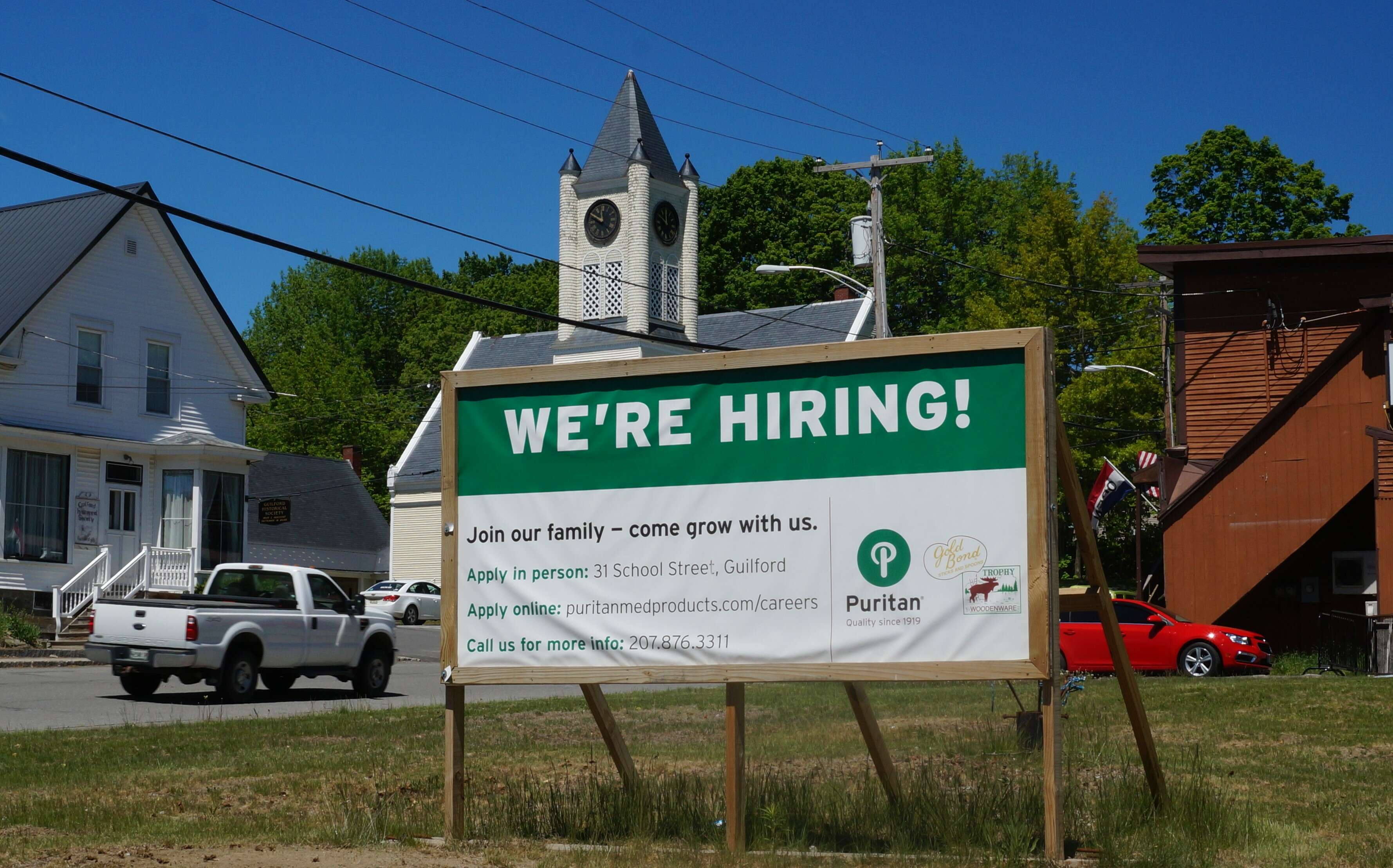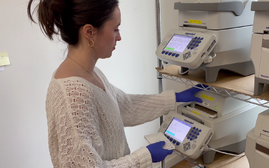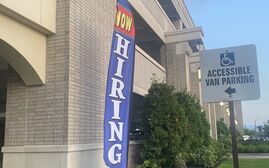
Processing Your Payment
Please do not leave this page until complete. This can take a few moments.
Puritan grows southward: Workforce, incentives made Tennessee 'right fit' for expansion
 Courtesy / Puritan Medical Products
Puritan Medical Products officials traveled to Tennessee this week to officially announce expansion to an Orlinda, Tenn., manufacturing plant. From left, Virginia Templet, director of marketing; Timothy Templet, executive vice president of Global sales; Scott Wellman, general manager; Kristy Rizzitello, director of human resources; David Perkins, senior operations project manager.
Courtesy / Puritan Medical Products
Puritan Medical Products officials traveled to Tennessee this week to officially announce expansion to an Orlinda, Tenn., manufacturing plant. From left, Virginia Templet, director of marketing; Timothy Templet, executive vice president of Global sales; Scott Wellman, general manager; Kristy Rizzitello, director of human resources; David Perkins, senior operations project manager.
When the federal government asked Puritan Medical Products to expand to another part of the country in order to efficiently ramp up COVID-19 testing swab production, Texas and Wisconsin were two of the suggested sites.
Officials from the Guilford-based manufacturer took a look at those states, but they liked Tennessee.
"It was the right fit, based on a lot of factors," Scott Wellman, Puritan general manager, told Mainebiz Tuesday. "The people are just like the people in Maine," he said. "They're warm and hard-working."
There are also a lot more of them — the population in a 45-mile radius of the plant's location in north central Tennessee equals that of Maine.
That was just one of the factors that made Tennessee the right fit. Other selling points were the location, logistics and incentives offered by Tennessee state and county development officials looking to boost the options for the county's workforce.
Wellman said one of the company's biggest challenges is finding employees as Puritan has nearly tripled its workforce in a year. The growth in COVID-19 testing swab production has been supported by nearly $300 million federal Defense Production Act money, including the $146.8 million awarded in March for the Tennessee expansion.
Puritan expects to hire 625 workers over five years after it retrofits a 400,000-square-foot former Dorman auto parts plant in Orlinda, Tenn., into a swab-producing powerhouse. Once it's fully up and running, the plant will have the capacity to add 200 million testing swabs a month to the 100 million Puritan is already producing in Guilford and Pittsfield.
Design work has already started for the $220 million project, and swab production is expected to begin in late November. The company's top executives, joined by Tennessee Gov. Bill Lee, and state and county officials, held a press conference in Orlinda Tuesday that officially announced the expansion.

Welcoming development incentives
Not only are the people themselves welcoming and eager to work, but so were the Tennessee Department of Economic and Community Development, the development arm of the Tennessee Valley Authority and the Robertson County Economic Development Board. Incentives they offered were a big factor in Puritan choosing the location.
"The whole economic development piece of Tennessee was just very opening," Timothy Templet, Puritan executive vice president of Global Sales, said.
The incentives include a nine-year payment-in-lieu of tax agreement, a development program known as PILOT, approved by the Robertson County Economic Development Board earlier this month, the Roberston County Connection reported.
The job creation piece made the Puritan project eligible for a level-four PILOT with the first six years at 100% abatement, the seventh year at 90%, the eighth year at 80% and the last year is 50%. Puritan's equipment PILOT will be for three years and 100%.
Six months before the pandemic, Puritan was already at its capacity in its 88,000-square-foot plant in Guilford, where it produced 12 million swabs a month. The company had expanded its building, which is across the street from its sister Hardwood Products Co., but it had nowhere else to go on its property in a residential neighborhood.
“We’re bursting at the seams,” Templet told Mainebiz in an interview in August 2019. It was hard to find employees in Piscataquis County, with 17,000 residents, the state's least populated. Guilford is far from Maine's spare interstate highway system and not an easy commute.
Templet, who lives in Cumberland, said he was itching to expend to a more accessible area of the state with a bigger workforce, but the ties to Hardwood, which produces wood products, made that difficult.

Pandemic expansion to Pittsfield
The opportunity finally came with the pandemic. Puritan expanded to more-accessible Pittsfield a year ago, when the federal government asked the company to ramp up its swab production from 18 million to 40 million.
As only one of two companies in the world that makes the diagnostic tools needed for COVID-19 testing — the other one is in Italy — Puritan has been a popular go-to for the federal government. Including $75.5 million in March 2020, the company had been awarded $126 million in DPA money before the $146 million for the Tennessee expansion.
The Pittsfield expansion was made possible in May by $75.5 million in DPA money, which covered the cost of renovating a 144,000-square-foot building Cianbro Corp. owned at 129 Main St. Cianbro used it for training, but it had been mostly empty since UTC Fire and Security moved out in 2015.
Since then, Puritan has added another Pittsfield plant, a 79,000-square-foot former shoe factory. The company now employs 1,400 people, nearly triple what it employed during the 2019 Mainebiz interview. About 550 work in Guilford, with the rest split between the two PIttsfield operations.
The federal money for the Tennessee plant will pay for everything but the building purchase and production equipment, Wellman said. Puritan is tapping Cianbro for the work. The Pittsfield company owns the 129 Main St. plant in that town, and renovated both it and the smaller Pittsfield plant for Puritan's specialized work.
"They've been a great partner," Wellman said. "They know what we need." Cianbro will hire local Tennessee contractors for the renovation work, Wellman said.
Besides worker availability and easier distribution to other parts of the country, the Tennessee expansion solves a logistical challenge the company had long before the pandemic. Many of its products require the kind of sterilization not possible onsite. Or anywhere in Maine. Many products make the 255-mile trip to Northborough, Mass., where they’re sterilized with radiation or ETO gas before returning to Maine to be shipped to customers.
Templet said Tuesday that since the COVID-19 testing products have been produced, shipments are also sent to Atlanta for sterilization. The Orlinda plant will be four hours from a sterilization site in Indiana. That will save both time and transportation costs, he said.

Boon for Robertson County
The expansion also will also be a boon for Robertson County. Once employment at the plant reaches its height in five years, it will be one of the biggest employers in the county of 66,000, county officials said.
When the Robertson County Economic Development Board approved the PILOT tax incentive agreement April 5, besides job creation, the board cited investments of $130 million in construction apart rom the acquisition cost of the building, as well as $90 million in equipment.
While the company's name wasn't yet made public, Robertson County Chief Economic Development Officer Margot Fosnes said, “It’s a good one. It’s going to be exciting." She said that the wage level is above average for the county.
Wellman told the board, "We’ll have jobs created, people employed" before the end of the year.
A Robertson County comprehensive plan in 2012 called for accelerating economic development and creating high-wage jobs. More than 70% of the county's employed residents left it every day to go to work, one of the highest out-commute rates in the state, the plan said. The goal was to development economic incentives to keep people in the county in north-central Tennessee that was once known for its tobacco.
Landing Puritan was part of an overall effort by the state's economic development department which, over the last five years, has brought a dozen development projects to the county, accounting for 1,300 job commitments and $471 million in capital investment, the TNECD said.
Still a Maine company
Puritan and Hardwood are limited partnerships under the Hardwood Manufacturing LP umbrella. The company began in Guilford as a toothpick manufacturer in 1919. The Puritan brand was trademarked for Hardwood's medical products in 1948. Hardwood, which trades under the brands Gold Bond and Trophy, still makes toothpicks, wooden spoons for ice cream, and other wood products.
Puritan, meanwhile, by the turn of this century, had become a global leader in diagnostics products, particularly a decade ago after it patented high-performance flocked swabs, as well media for viral and bacterial transport, and a line of specimen-collection devices. Besides COVID-19 testing swabs, the company makes more than 1,200 types of swab and single-use sample collection devices for medical, diagnostics, microbiology, forensics and other industries.
When the company started making products more sophisticated than swabs, “the world started opening up,” Templet told Mainebiz in 2019. But he said then, and stressed again Tuesday that the company founded by his family more than 100 years ago will remain a Maine company.
Despite the challenges of remaining in Guilford, and the expansion to a factory 1,300 miles away, Templet said its headquarters will stay here. He said the company was built on the hard work of the Mainers it employs, many representing families who have worked for the Guilford company for generations.
“I personally, and the families that own Puritan, appreciate all the support of the employees in Maine, including our leadership team," he said. "If it wasn’t for their hard work and support, as well as the support of the federal government, we would not be where we are today."













0 Comments